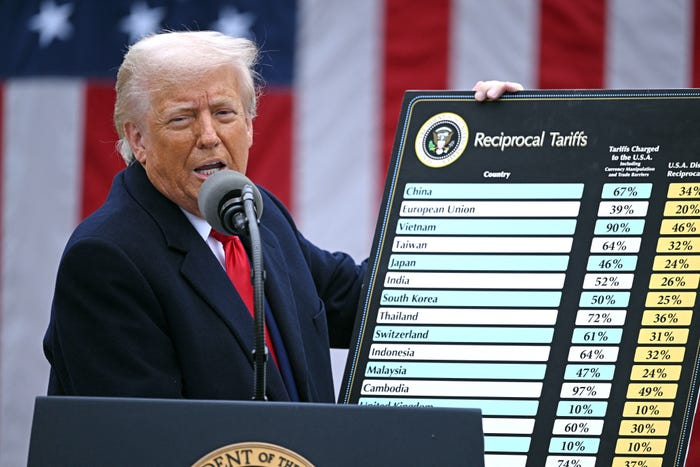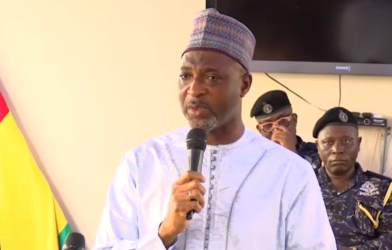By: Nana Karikari, Senior Global Affairs Correspondent
The United States’ new executive actions on H-1B visas and the proposed “gold card” program have ignited a global firestorm. This policy shift is more than just a bureaucratic change; it’s a redefinition of America’s relationship with the rest of the world.
The United States is moving from a land of opportunity to a gatekept community where wealth determines access. While the new rules apply globally, their financial and symbolic implications resonate profoundly in nations like Ghana, where the “American dream” has long been a powerful aspiration.
A Two-Tiered System The New Fee and The ‘Gold Card’
On Friday, September 19, President Donald Trump signed an executive action imposing a new annual $100,000 (approximately 1,227,514 Ghanaian cedis) fee for H-1B visa applications. This proclamation is a decisive move to curb what the administration calls the “overuse” of the program, a sentiment that has been at the core of Trump’s immigration platform.
While a White House official, who was granted anonymity, confirmed that the fee aims to force companies to prioritize American workers, Commerce Secretary Howard Lutnick and White House Staff Secretary Will Scharf later spoke on the record. Lutnick, in a public statement, called the H-1B visa system a “scam” that “lets foreign workers fill American job opportunities” and declared, “Now is the time to hire Americans.”
For aspiring professionals from countries like Ghana, where the average annual income is a fraction of this amount, the fee creates an insurmountable barrier. The pressure falls squarely on the sponsoring company, forcing a difficult cost-benefit analysis.
For aspiring professionals from countries like Ghana, where the average annual income is a fraction of this amount, the fee creates an insurmountable barrier. The pressure falls squarely on the sponsoring company, forcing a difficult cost-benefit analysis.
In a separate order, the president also established a “gold card” immigration pathway, a stark example of a two-tiered system where wealth is the primary criterion for entry. This policy will fast-track visas for foreigners in exchange for a hefty contribution: $1 million (about 12,275,140 GHS) for an individual and $2 million (about 24,550,280 GHS) for a company sponsoring a foreign worker.
These moves mark the latest in a series of efforts from the administration to crack down on immigration and place sharp new limits on the types of foreigners allowed into the country. They threaten to significantly impact industries, especially the technology sector, that depend heavily on H-1B workers.
The Price of Talent: A New Global Reality
The new H-1B fee has placed an immense burden on sponsoring companies. Secretary Lutnick’s statement, “The company needs to decide… is the person valuable enough to have a $100,000 a year payment to the government or they should head home, and they should go hire an American,” has ignited strong reactions. Critics argue this view devalues the immense talent and dedication of foreign professionals. Ato Hayford, a Ghanaian tech professional noted, “It feels like they’re telling us our talent isn’t enough, that our only value is our bank account.”
For many, this new reality forces a re-evaluation of their career trajectories. A software developer who might have sought an H-1B visa may now be more inclined to stay and contribute to Ghana’s burgeoning tech ecosystem, potentially fueling local innovation. However, many argue this view is overly optimistic, fearing the new policies will simply limit the very talent pool Africa needs to grow.
The “gold card” program is a stark example of this two-tiered system. It exacerbates the growing divide between those who can afford immigration and those who rely on merit-based, skilled worker programs. As Nigerian graduate student Nzube Ohalete put it, “The gold card is an old idea in expensive new garb.”
Ghana and Africa: A Diplomatic Dance
The Ghanaian government, led by the National Democratic Congress (NDC), is not only reacting to the visa fees but also grappling with the fallout from a separate agreement with the US to accept West African deportees. Ghana’s Foreign Affairs Minister, Samuel Okudzeto Ablakwa, has publicly defended the move on humanitarian grounds. “We just could not continue to take the suffering of our fellow West Africans,” he said, citing pan-African solidarity.
This stance, however, has drawn sharp criticism from the main opposition New Patriotic Party (NPP). The NPP has threatened to take the government to the Supreme Court, arguing the agreement was made without the necessary parliamentary approval, a violation of the country’s constitution. This internal political friction highlights the complex diplomatic tightrope the government must walk.
Beyond direct diplomacy with the US, Ghana is actively strengthening its relationships with other nations in the Global South. The country’s new visa-waiver agreements with Colombia and Morocco signal a strategic pivot away from a reliance on Western nations and toward a more self-reliant, pan-Africanist approach.
Political and Economic Context: Behind the Policy
Trump’s stance on immigration has fluctuated, and the issue has sharply divided his supporters. During his 2016 campaign, he accused companies of using H-1B visas to “substitute for American workers at lower pay.” However, he has also defended the program, telling the New York Post that he is “a believer in H-1B.” During the Oval Office signing, President Trump framed the new policy as a way to ensure the US only accepts the “best and brightest” from around the world.
“We need workers. We need great workers, and this pretty much ensures that that’s what’s going to happen,” Trump said from the Oval Office, adding that he thought the tech industry would be “very happy” despite widespread criticism that the fees will stifle innovation and talent acquisition.
The new policies come amid criticism from Secretary Lutnick, who argued that the existing green card process for immigrants resulted in the country taking in the “bottom quartile” of workers from abroad. Lutnick stated, “We’re going to only take extraordinary people at the very top” with the gold card program.
The H-1B program has also long divided conservatives. Some, like former Trump advisor Stephen K. Bannon, have called it a “total scam” and advocated for its elimination. Others, like Senator Jim Banks, have proposed legislation to increase the wage floor for H-1B workers to $150,000 and replace the lottery system with a merit-based one. This internal debate within the Republican Party demonstrates the complex ideological split on immigration and labor policy.
Voices on the Ground
The new policies are impacting individuals on both sides of the Atlantic. Nana Afia Saa Agyeman, a Ghanaian student hoping to study in the US said, “The thought of a visa now feels like a luxury I can’t afford, not an opportunity I can earn.”
Garrett Norwick, an American who relies on the program for their company’s talent lamented, “This isn’t real policy — it’s fan service for immigration restrictionists. Trump gets his headlines, and inflicts a jolt of panic, and doesn’t care whether this survives first contact with the courts.”
The new rules are also affecting ordinary Ghanaians. One international traveller from Accra, Nii Okai Addardey, said the new regulations “make you feel like a second-class citizen. You have to reapply every time you want to go back home for a holiday, which adds to the stress and cost.”
Another Ghanaian business owner, Dzifah Akakpo, said, “It forces us to think locally. Instead of seeing our best minds leave, maybe now they will stay and build Ghana. It’s a wake-up call for us to invest in our own economy.”
A Global Shift
The US isn’t the only country tightening its borders, but its actions carry a unique weight due to its history as a global destination for talent. For years, the H-1B visa program was seen by many as a lifeline, a pathway for skilled workers to contribute to the American economy.
Now, with a new financial barrier and a clear preference for wealth, the US risks losing its competitive edge to countries like Canada and the United Kingdom, which are actively streamlining their immigration processes to attract global talent.
This new reality forces nations like Ghana to confront the need for self-reliance, transforming a challenge into an opportunity to build a more resilient and prosperous future at home.












